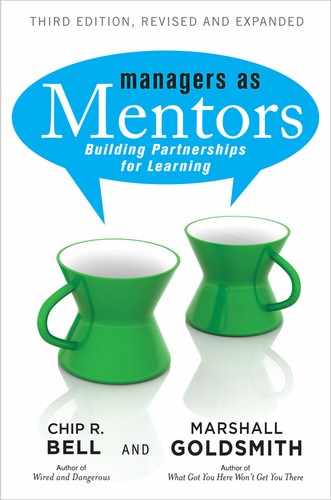PART 1
MENTORING IS …
I am not a teacher, but an awakener.
Robert Frost
Take a minute to recall the people in your life who were effective at helping you learn something important. (We’ll wait.) Chip’s mother taught him a lot about dating etiquette when he was a teenager; one of Marshall’s doctoral professors at UCLA taught him about humility. Who taught you emotional intelligence in an adult world? Where did you learn to not call the CEO by her first name, how to get a great table at a restaurant, where to put your soup spoon when you have finished your soup, or how full to fill the wineglasses when you have guests over for dinner? Over the course of our lives, learning comes from many people, in many places, and through many events.
What are the reasons that people sometimes learn and sometimes fail to learn? What are the reasons that some people are skilled at helping others with personal or professional growth and some are not? Why does mentoring sometimes make an impact and at other times seem a complete waste of time and energy? What conditions and competencies spark discovery, insight, and understanding?
The complete answers to questions like these could occupy volumes—and you’re holding only a single book. As you will see, there are tools, tips, tactics, and techniques that make mentoring easier to understand, more effective, and a lot more fun—but to become good at the game, we must first mark off the playing field. Before we learn the pointers, we need to be clear on the meaning of mentoring and in harmony with the conditions conducive to its effectiveness.
The goal of the next few chapters is to explain the arena or context of mentoring. We opened the book by defining mentoring as simply “the act of helping another learn.” Mentoring is traditionally thought of as a transaction between a tutor and somebody else’s subordinate. However, Managers as Mentors will focus largely on the leader mentoring a follower. This will require a unique alteration in the relationship—actions aimed at eliminating (or at least reducing) the role that position power plays in the tutelage.
The mentoring arena is filled with assumptions about how people learn, roles mentors can play, qualities mentors should pursue, and traps mentors need to avoid. Because the mentor is also a learner, the intent of the next few chapters is to prompt self-examination, to advocate clarity of mission, and to nurture the linkage of who we are with what we do.
